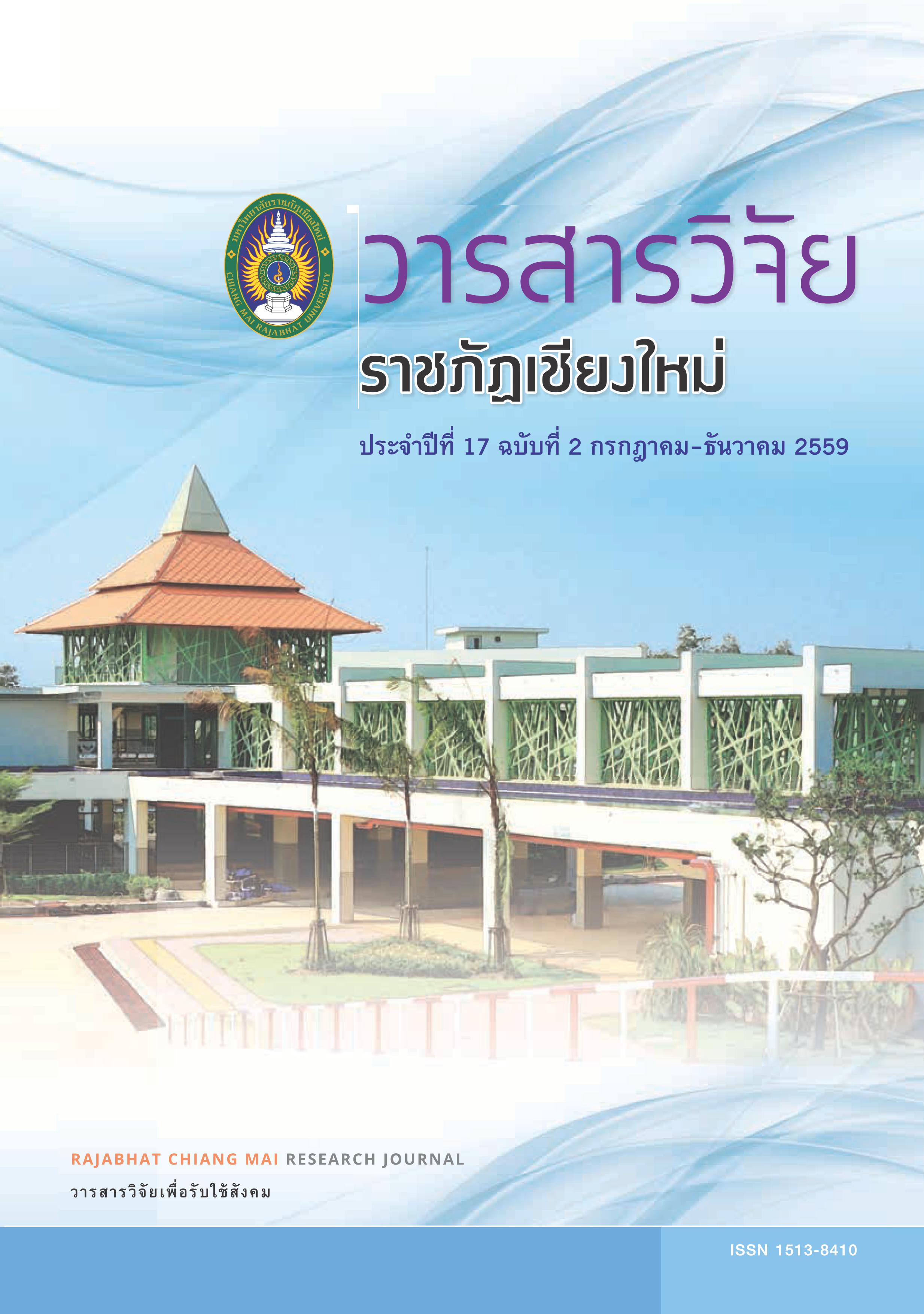The Development of Community Participation Management by Appreciation Influence Control in Ban Den Municipality School, Mae Ai District, Chiang Mai Province
DOI:
https://doi.org/10.14456/rcmrj.2016.213917Keywords:
Appreciation Influence Control (AIC), Developing Participation/Participation, Educational AdministrationAbstract
The purposes of this study, aimed to investigate the present situations and on-going strategies for the community participation management by appreciation influence control in Ban Den Municipality School, Mae Ai District, Chiang Mai Province. Target group for the study of the community participation management included 40 members from the basic educational committee, community representatives and parent representatives, with a questionnaire survey. Another the target group for the finding community participation using appreciation influence control included 22 members from the basic educational committee, community representatives and parent representatives with a manual of the appreciation influence control technique (AIC). Qualitative Analysis were applied with the use of mean and standard deviation. Narrative technique was employed in content analysis.
The findings of the study divided into two major aspects were as follows:
1. Community participation in organizational administration at glance
1.1 Academic management: Overall it was stated that the three targeted groups’ community participation in their academic management was rated at a high level. The basic educational committee and community representatives rated it at a high level, meanwhile the parent representatives rated their participation at a moderate level;
1.2 Budget management: it was stated that the three targeted groups’ community participation in their budget management was rated at a high level. The basic educational committee and community representatives rated their participation at a high level, whereas parent representatives rated their participation at a moderate level;
1.3 Personnel management: it was stated that the three targeted groups’ community participation in their personnel management was rated at a moderate level. The basic educational committee and community representatives rated their participation at a high level whereas parent representatives rated their participation at a moderate level;
1.4 General management: it was stated that the three targeted groups’ community participation in their general management was rated at a high level. The basic educational committee rated their participation at the highest level, followed by the community representatives and the student parents respectively.
2. The on-going strategies for the development of the three targeted groups’ community participation in their organizational management were suggested that the provisions for the enhancement of the school’s practical vision and missions with well-planned organizational management; the community residents’, teachers’ and student parents’ better understandings of their educational management; the community residents’ opportunities in participating in their organizational management, and the community residents’ goals for participating in their organizational management taken place in the academic year 2016 be all required. Not only should the school’s on-going strategies for participatory process development be set up, but also the school staff’s better understandings of their participation in personnel management should also be encouraged. Moreover, the other involved participants’ cooperation in effectively managing the five major projects (e.g. project for school staff’s community participation; project for community paradigm shifts on participatory educational management; project for Mother’s day with her educational sponsorship; project for Father’s day with his financial supports, and project for educational fieldtrips) should be enhanced.
The information from the study help the parents, the community leaders, the school boards know the importance and adapt that the community role on the participation in the education can support and solve the education problem for the betterment of the community.
Downloads
References
กระทรวงศึกษาธิการ. 2546. พระราชบัญญัติการศึกษาแห่งชาติ พ.ศ. 2542 และที่แก้ไขเพิ่มเติม (ฉบับที่ 2) พร้อมกฎกระทรวงที่เกี่ยวข้อง. กรุงเทพฯ: โรงพิมพ์องค์การรับส่งสินค้าและพัสดุภัณฑ์.
กาญจนา หาทรัพย์. 2553. การมีส่วนร่วมในการจัดการศึกษาของคณะกรรมการการศึกษาขั้นพื้นฐานในโรงเรียนแกลง “วิทยาสถาวร” สังกัดสํานักงานเขตพื้นที่การศึกษามัธยมศึกษา (ชลบุรี-ระยอง) เขต 18. สารนิพนธ์ศึกษาศาสตรมหาบัณฑิต สาขาการบริหารการศึกษา บัณฑิตวิทยาลัย วิทยาลัยทองสุข.
ทศพล ผลทวีนุกูล. 2551. การมีส่วนร่วมในการจัดการศึกษาของคณะกรรมการสถานศึกษาขั้นพื้นฐานโรงเรียนสังกัดสำนักงานเขตพื้นที่ประถมศึกษานครปฐม เขต 1. วิทยานิพนธ์ศึกษาศาสตรมหาบัณฑิต สาขาพัฒนศึกษา มหาวิทยาลัยศิลปากร.
ประภาพรรณ เส็งวงศ์. 2550. การพัฒนานวัตกรรมการเรียนรู้ด้วยวิธีวิจัยในชั้นเรียน. กรุงเทพฯ: อี.เค.บุ๊คส์.
ปาริฉัตต์ กล่อมสกุล. 2550. สภาพและแนวทางการมีส่วนร่วมของผู้ปกครองในการจัดการศึกษา: กรณีศึกษาโรงเรียนท้ายพิกุล. วิทยานิพนธ์ครุศาสตรมหาบัณฑิต สาขาหลักสูตรและการสอน มหาวิทยาลัยราชภัฏเทพสตรี.
มาโนช จุลสุคนธ์. 2551. ความต้องการของผู้ปกครองด้านคุณภาพผู้เรียนตามมาตรฐานการศึกษาขั้นพื้นฐานโรงเรียนภัทรดล อำเภอโพธิ์ชัย จังหวัดร้อยเอ็ด. วิทยานิพนธ์ครุศาสตรมหาบัณฑิต สาขาการบริหารการศึกษา มหาวิทยาลัยราชภัฎมหาสารคาม.
โรงเรียนอนุบาลเทศบาลตำบลแม่อาย (บ้านเด่น). 2555. รายงานการพัฒนาคุณภาพการศึกษา ประจำปีการศึกษา 2555. เชียงใหม่. (อัดสำเนา).
วรลักษณ์ พลรบ. 2550. การมีส่วนร่วมในการจัดการศึกษาของผู้ปกครองที่ส่งผลต่อการปฏิบัติงานตามมาตรฐานการศึกษาศูนย์พัฒนาเด็กเล็กของเทศบาล. วิทยานิพนธ์ศึกษาศาสตรมหาบัณฑิต สาขาวิชาการบริหารการศึกษา มหาวิทยาลัยศิลปากร.
สมศักดิ์ ไชยโชติ. 2550. สภาพและปัญหาการจัดการเรียนร่วม ตามมาตรฐานการศึกษาพิเศษโรงเรียนเรียนร่วม สังกัดสำนักงานเขตพื้นที่การศึกษาประถมศึกษากาฬสินธุ์ เขต 3. วิทยานิพนธ์ครุศาสตรมหาบัณฑิต สาขาวิชาการศึกษาพิเศษ มหาวิทยาลัยราชภัฏสกลนคร.
สุภัทร ชูประดิษฐ์. 2550. วัฏจักร 5 ขั้นตอนของกระบวนการ AIC. (ระบบออนไลน์). แหล่งข้อมล: http://gotoknow.org./blog/communityblog/21663 (26 มิถุนายน 2551)
Luther Gulick. 1937. Paper on the Science of Administration. Clifton: Augustus M. Kelley.
Downloads
Published
How to Cite
Issue
Section
License
1. Articles, information, content, images, etc published in the “Community and Social Development Journal” are copyrighted by the Community and Social Development Journal, Chiang Mai Rajabhat University. In order to properly distribute the articles through print and electronic media, the authors still hold the copyright for the published articles under the Creative Commons Attribution (CC BY) license, which allows the re-distribution of the articles in other sources. References must be made to the articles in the journal. The authors are responsible for requesting permission to reproduce copyrighted content from other sources.
2. The content of the articles appearing in the journal is the direct responsibility of the article authors. The editorial board of the journal does not necessarily agree with or share any responsibility.














